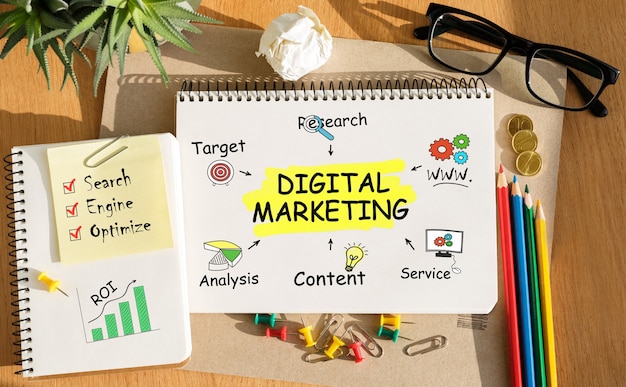Creating A Digital Marketing Plan for Businesses In Kenya
Learn how to create a comprehensive digital marketing plan for your business in Kenya. Boost your online presence & increase sales with our expert tips.

In today's fast-paced digital landscape, businesses in Kenya face increasing competition, making a solid digital marketing strategy essential to staying ahead.
However, with the plethora of options available, it can be difficult for small businesses to find the most effective strategies to connect with their target audience and drive growth.
In this blog post, we will look at the importance of creating a digital marketing plan for businesses in Kenya. We will walk you through the process of developing a plan.
This includes identifying your target market and setting clear goals, selecting suitable platforms and channels, and creating a content calendar and budget.
A solid online marketing plan will not only make it easier for small businesses to navigate the ever-changing landscape, but also increase their chances of success.
The importance of a digital marketing strategy for businesses in Kenya

As mentioned earlier, digital marketing is crucial for small businesses in Kenya to compete and succeed in today's electronic age.
A well-thought-out online marketing strategy can help businesses in Kenya reach and engage with their target audience, increase brand awareness, and boost sales.
Without a strategy, businesses risk falling behind in the highly competitive online market.
Lack of visibility on search engines and social media can make it difficult for businesses to attract new customers and retain existing ones. Without a clear plan, businesses can also waste resources on ineffective marketing efforts.
Having a digital marketing strategy in place:
-
Allows businesses to focus on tactics that are likely to produce results.
-
Is cost-effective, making it ideal for businesses with limited budgets.
-
Enables businesses to target specific demographics and geographies.
-
Helps in delivering measurable results, allowing companies to track the effectiveness of their marketing efforts and make adjustments as necessary.
-
Allow companies to connect with customers in real time, building trust and loyalty.
-
Help increase visibility and reach a wider audience.
-
Enables businesses to stay ahead of the competition by keeping up with industry trends and technologies.
-
Can help build a loyal customer base by providing valuable content, offering promotions and discounts, and providing excellent customer service.
-
Allows businesses to adapt quickly and respond to market changes and customer needs.
-
Allow businesses to improve their online reputation and credibility, increasing their chances of attracting new customers.
Maximize Your Online Presence with Our Digital Marketing Agency
-
SEO: Unlock more SEO traffic and see real results with our expert optimization services.
-
Content marketing: Attract and retain customers with high-quality, engaging content that drives traffic and generates leads.
-
Social media marketing: Our team creates epic content that will get shared, get links, and attract traffic on social media platforms.
-
Google Ads: Effective paid strategies with clear ROI. Let our team help you get the most out of your ad spend.
-
Email marketing: Connect with your audience and drive conversions with targeted email campaigns.
-
Web design and development: A visually appealing and user-friendly website is key to attracting and retaining visitors. Our team can help you create a website that converts.
The process of creating a digital marketing strategy
Creating a digital marketing plan can appear daunting, but it is a necessary step for businesses that want to build a strong online presence and reach their target market.
A well-developed digital marketing plan helps businesses understand their target audience, set clear goals, and develop effective strategies to achieve those goals.

1. Identify the target audience and goals
Knowing your target audience and setting clear goals are critical steps in developing a successful online marketing tactic.
After all, without knowing who your target audience is and what they want, it will be difficult to create effective campaigns that get results.
The first step to identifying your target audience is to gather as much information about them as possible. This includes demographic data such as age, gender, location, income, and education level.
It also includes understanding their interests and problems, and what they want from a product or service.
Once you have a clear picture of your target audience, you can set specific goals for your campaigns.
These goals should be SMART (Specific, Measurable, Attainable, Relevant, and Time-bound) and should align with your overall business goals.
For example, a goal could be to increase website traffic by 20 percent within the next six months.
To achieve these goals, it is vital to research and analyze the various internet marketing channels available.
When companies understand the unique characteristics and audience of each channel, they can develop a tailored strategy that will deliver the most effective results for their target audience.
It is equally important to monitor and adjust your campaigns continuously, using data and analytics to make informed decisions. This includes regularly tracking performance metrics such as website traffic, engagement rates, and conversion rates.
This way, Kenyan businesses can effectively identify their target audience and achieve their marketing goals.
2. Choose the right digital marketing platforms

For Kenyan businesses, figuring out which digital marketing platform will be most effective in reaching their target audience and achieving their marketing goals can be a challenge.
However, when businesses understand the unique features and target audience of each platform, they can develop a customized strategy that will lead to the most effective results.
Here are some popular advertising platforms for businesses in Kenya to consider:
- Facebook: Facebook is one of the most popular social media platforms in Kenya with a large and diverse audience. It is a prolific platform to build communities and engage with customers through posts, comments, and messages.
The platform also offers a wide range of features such as groups, pages, and events that can be used to connect and engage with specific audiences.
Companies can run paid advertising campaigns on the platform and reach a wide audience with features such as sponsored posts, videos, and carousel advertisements.
- Instagram: Instagram is a visual platform that is ideal for showcasing products and services. It has a large and growing user base in Kenya and is especially popular among younger demographics. Instagram's features such as hashtags, stories, and IGTV allow for increased reach and engagement with customers.
Businesses can run paid advertising campaigns on the platform and reach a wide audience through features such as sponsored posts, Stories, and IGTV ads.
- Twitter: Twitter is a great platform for real-time engagement and customer service. It is also a helpful platform for small businesses to connect with influencers and other businesses in their industry.
Twitter features like hashtags, mentions, and direct messages make it easy to interact with customers and other users.
- LinkedIn: LinkedIn is a professional networking platform that is ideal for businesses that want to connect with other professionals in their industry.
It is a helpful platform for building relationships, sharing industry knowledge, and promoting B2B services. It also offers features such as groups, company pages, and job postings that can be used to reach specific audiences and recruit employees.
Companies can run paid adverts on the platform and reach a wide audience through targeting options such as job title, industry, and location. This makes the platform ideal for B2B marketing and recruiting efforts.
- YouTube: YouTube is the second largest search engine in the world and a superb platform for businesses to create and share video content, create brand awareness and drive traffic to their website.
YouTube features such as video ads, playlists and comments can be used to target specific audiences and increase customer engagement.
Businesses can run paid ads campaigns on the platform and reach a wide audience through targeting options such as demographics, interests, and behaviors. It is also an ideal platform for product demos and educational content.
- Pinterest: Pinterest is a visual platform that is ideal for businesses that are in the product-based industry. It is an excellent platform to showcase products and services especially fashion, home decor, and DIY projects, and drive traffic to the website.
Pinterest features such as boards, pins, and rich pins make it easy to organize and share content. It also allows businesses to run paid advertising campaigns on the platform and reach a wide audience through targeting options such as interests, keywords, and demographics.
- TikTok: TikTok is a short video platform that is becoming more and more popular in Kenya, especially among the younger generation. It is a useful platform for small businesses to create creative and engaging video content and reach new audiences.
TikTok's features like sounds, filters, and effects allow for easy customization and interaction with customers.
- Google Ads: Google Ads (formerly Google AdWords) is a powerful tool for businesses in Kenya looking to increase visibility and boost sales.
It allows businesses to run pay-per-click (PPC) advertising campaigns on the search engine results page (SERP) and reach a bigger audience through targeting options such as keywords, demographics, and location.
Other platforms such as Snapchat, Telegram, and WhatsApp are also popular in Kenya and can be used by businesses to reach specific audiences and improve interactions with customers.
In addition, businesses can also consider using online marketplaces such as Jumia, Jiji, and Kilimall to reach customers and sell products online.
It is pertinent to note that businesses do not need to be on every platform but should focus on platforms that align with their target audience and goals.
3. Create a content calendar and budget

Creating a content calendar and setting a budget are two essential steps for a successful online marketing technique for businesses.
A content calendar helps plan the types of content that will be shared, the frequency of posts, and the overall tone and message of the content. This ensures that the content is consistent and aligns with the overall goals of the campaign.
A budget, on the other hand, helps allocate resources and determine how much to spend on different aspects of the campaign.
Here are some tips for creating a content calendar and budget for your business:
-
Remember your goals: When creating a content calendar, it is critical to bear in mind your goals for digital marketing. This will guide the types of content you create, the platforms you use for distribution, and the schedule for publishing the content.
-
Discover topics: Identify the most relevant topics that align with your business goals and target audience.
-
Consider your audience: Considering your audience is critical when creating a content calendar that resonates with them. Research your audience's demographics, interests, and behaviors to ensure your content is relevant and engaging.
-
Plan your content: Once you have your goals and audience in mind, you can start planning the types of content you want to create. This can include blog posts, videos, infographics, and social media posts. Be sure to mix up the types of content to keep your audience engaged.
-
Set a schedule: Set a schedule for when you will publish your content. This could be daily, weekly, or monthly, depending on your resources and goals. Ensure you create reminders for yourself to ensure you stick to the schedule.
-
Set a budget: Determine how much money you are willing to spend on creating and publishing your content. This can include costs for equipment, software, and freelance writers or designers. You should also factor in the cost of paid advertising.
-
Use free tools: Use free content creation tools and resources, such as Canva, Grammarly, and Freepik, to keep costs down.
-
Continuously monitor and adjust: Continually review and tweak your content calendar and budget to ensure they are still aligned with your goals and audience. This can include testing different types of content, adjusting your schedule, and changing your budget as needed.
In summary, creating a digital marketing plan for businesses in Kenya is essential for success in today's modern age.
By understanding their target audience, setting clear goals, choosing the right platforms and channels, creating a content calendar and budget, and continuously tracking and optimizing their campaigns, businesses can increase their web presence and reach their desired audience.
With the right online marketing tactics, businesses can stand out in a crowded market, increase sales and build a loyal customer base.
As one of the leading digital marketing agencies in Kenya, Tabala Digital Solutions is dedicated to helping small businesses in Kenya succeed in the online landscape. Contact us today to learn more about how we can help your business succeed online.

Strategist Profile
Abala Tom
Digital systems strategist specializing in high-performance SEO, Google Ads, and conversion optimization. Mission: to replace marketing 'guesswork' with predictable revenue systems.